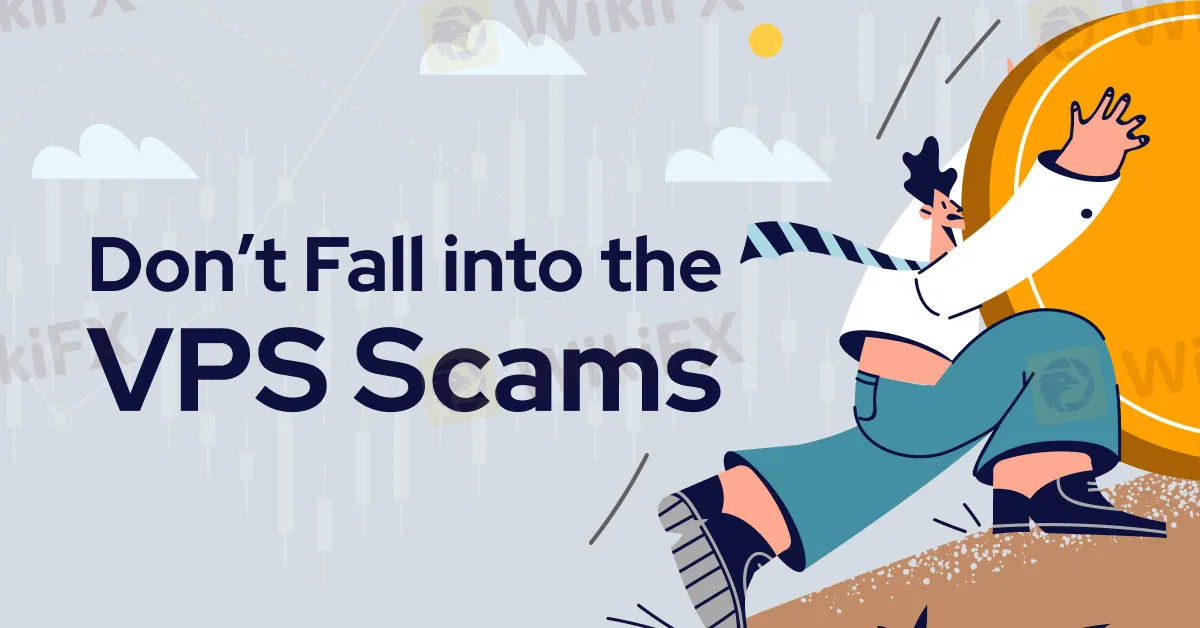简体中文
繁體中文
English
Pусский
日本語
ภาษาไทย
Tiếng Việt
Bahasa Indonesia
Español
हिन्दी
Filippiiniläinen
Français
Deutsch
Português
Türkçe
한국어
العربية
Don’t Fall into the VPS Scams
Abstract:In the rapidly evolving landscape of online services, Virtual Private Servers (VPS) have become indispensable for individuals and businesses seeking reliable hosting solutions, yet the surge in demand has spawned unscrupulous entities exploiting users through VPS scams. This article exposes common scam tactics, offering essential tips to safeguard your investments in VPS services, and introduces WikiFX’s VPS services, providing a secure and flexible solution amidst the red flags of the industry.

In the ever-evolving landscape of online services, Virtual Private Servers (VPS) have become a crucial component for individuals and businesses seeking reliable hosting solutions. Unfortunately, this surge in demand has given rise to unscrupulous entities seeking to exploit unsuspecting users through VPS scams. In this article, we will shed light on the common tactics employed by scammers and provide essential tips to help you safeguard your investments in the realm of VPS services.
Here, we outline key red flags to watch out for, empowering users to make informed decisions and safeguard their online investments.
Too-Good-To-Be-True Offers: Proceed with Caution
One of the foremost red flags when considering a VPS provider is the allure of too-good-to-be-true offers. Exercise caution when encountering providers that promise exceptionally low prices or seemingly unlimited resources. Genuine VPS services adhere to reasonable pricing structures based on the actual resources provided. Offers that deviate significantly from industry standards may be indicative of potential scams, highlighting the importance of thorough scrutiny before making any commitments.
Lack of Transparent Terms and Conditions: Demanding Clarity
Legitimate VPS providers prioritize transparency by maintaining clear and comprehensive terms of service. These should include explicit details about server uptime guarantees, refund policies, and any additional charges. On the contrary, scammers may deliberately obscure or omit such critical information, leaving users vulnerable to hidden terms and unexpected fees. A lack of transparency in terms and conditions should be viewed as a significant red flag, urging potential users to scrutinize the details before entering into agreements.
Unverified Providers: The Importance of Due Diligence
Before entrusting your hosting needs to any VPS service, it is paramount to conduct thorough research on the provider. Check for customer reviews, testimonials, and evaluate the provider's overall reputation within the online community. Trusted review platforms serve as valuable resources, offering insights into the experiences of other users and aiding in the identification of potential scams. Choosing an unverified provider without proper due diligence may expose users to unnecessary risks, emphasizing the importance of a well-informed decision-making process.
This is where WikiFX‘s VPS services come into play. Available in more than 10 countries and supporting over 7 system languages with 1800+ global acceleration nodes, WikiFX’s VPS ensures widespread distribution for environmental factors not to adversely affect EA transactions, guaranteeing seamless execution. Moreover, WikiFXs VPS allows traders to access their trading platforms on any computer without the need for an installed MT4/MT5 platform, providing flexibility and convenience. Understanding the importance of speed for traders, WikiFX's VPS services offer swift transaction execution, minimizing slippages and delays for more efficient trading in a safe and protected environment.
WikiFX provides four types of VPS starting at a minimal cost of 10 cents per month, acknowledging the fundamental right of every trader and investor to access an efficient and affordable trading environment. For detailed information, visit https://cloud.wikifx.com/en/vps.html or utilize the WikiFX mobile app to explore the VPS features.





Disclaimer:
The views in this article only represent the author's personal views, and do not constitute investment advice on this platform. This platform does not guarantee the accuracy, completeness and timeliness of the information in the article, and will not be liable for any loss caused by the use of or reliance on the information in the article.
Read more

CySEC Revokes UFX Broker Licence as Reliantco Halts Global Operations
The Cyprus Securities and Exchange Commission (CySEC) has officially withdrawn the Cyprus Investment Firm (CIF) licence of Reliantco Investment Limited, the operator of UFX.com. This decision followed a six-month period during which the company failed to provide any investment services or perform investment activities.

Elon Musk Sparks Debate Over Presidential Power and Federal Reserve Independence
Elon Musk has voiced his support for the controversial idea that United States presidents should have a role in shaping Federal Reserve policies. This endorsement aligns with recent remarks from President-elect Donald Trump, who has hinted at revisiting the central bank's independence, a long-held tradition in the nation's financial governance.

Consob Sounds Alarm: WhatsApp & Telegram Users Vulnerable to Investment Scams
Italy's financial regulator, Consob, has raised alarms over an increase in fraudulent schemes targeting investors through mobile messaging platforms such as WhatsApp and Telegram.

Crypto 101: Coins vs Tokens
For those new to the world of cryptocurrency, terms like "coin" and "token" may seem interchangeable. However, understanding the distinction between these two digital assets is crucial for navigating the crypto landscape. Both coins and tokens serve as integral components of blockchain ecosystems, yet they differ in their functionalities, use cases, and the technologies underpinning them.
WikiFX Broker
Latest News
Tokyo Police Arrest 4 for Unregistered FX Trading Scheme
BSP Shuts Down Uno Forex Over Serious AML Violations
ACY Securities Expands Global Footprint with South Africa Acquisition
Rupee gains against Euro
WikiEXPO Global Expert Interview: The Future of Financial Regulation and Compliance
DFSA Warns of Fake Loan Approval Scam Using Its Logo
Consob Sounds Alarm: WhatsApp & Telegram Users Vulnerable to Investment Scams
CySEC Revokes UFX Broker Licence as Reliantco Halts Global Operations
Axi Bids AUD 52M to Acquire Low-Cost Broker SelfWealth, Outbidding Competitor Bell Financial
Crypto Influencer's Body Found Months After Kidnapping
Currency Calculator


